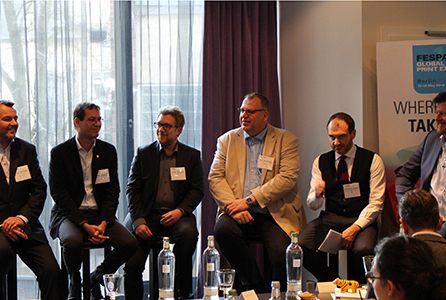Mimaki to promote Tiger at fashion-minded FESPA
Mimaki has said that it will dedicate its space to the Tiger 1800B at this year’s FESPA in Berlin, as the show has a particular focus on the fashion and textile markets, in the form of Print Make Wear.

Wednesday, 21 Feb 2018 10:20 GMT

FESPA and Mimaki will concentrate on textiles and fashion, and work towards promoting the Tiger 1800B
The idea is to entice fashion designers, suppliers, and brands to the show, as this part of textiles has been identified as a growth area. Smithers Pira carried out research in partnership with FESPA, which identified textiles and fashion, as well as corrugated packaging (which FESPA are also promoting) as fast-growing sections of the print and sign industries.
The Japanese manufacturer has decided to follow FESPA’s dedication to textiles, fashion, and its Print Make Wear section, by showcasing its range of printers that focus on this market. Danna Drion, marketing manager EMEA at Mimaki Europe, explains: “We are in the latest planning stages at the moment, to make sure everything is ready. We have an overall theme on our booth, and it also reflects back on our machines, on our applications, on everything that we are doing during FESPA. We have main focus areas as well, and one of the main focus areas is textiles.”

At this FESPA, we are definitely going to focus on our Tiger”
Bert Benckhuysen, product manager at Mimaki Europe, adds: “At this FESPA, we are definitely going to focus on our Tiger. As we know, the [launch of the] Tiger was quite a while ago, but recently the Tiger was also launched for direct printing, with the reactive ink. There are already installations, and recently we added the paper sublimation option, which we are going to show at FESPA.”
The Tiger 1800B has received well across the board, as it is available in direct to textile and sublimation versions.
Ronald Van den Broek, general sales manager of sales at Mimaki Europe, comments: “Mimaki was an early mover in digital textile printing, as early as 1998. Over the ensuing years, we have developed in-depth experience with printing on textiles and a robust textile printing offering. We have also brought to market an industry-leading array of inks that allows our printers to image just about any fabric on the market.”
Van den Broek continues: “With the Tiger 1800B, we have moved from entry-level and mid-range offerings to a true production model that will help speed up the analogue-to-digital transformation the industry is currently undergoing. Digital textile printing has grown by an average of 30 percent over the past five years, and we believe it is poised to enter the hockey-stick phase of growth over the next couple of years.”

FESPA Press Fest welcomed figures from leading companies that will be at FESPA, and this included Mimaki’s Bert Brenckhuysen
Hybrid Services, the exclusive Mimaki distributor in the UK and Ireland, has installed a Tiger 1800B in its showroom, because of the expectations surrounding textile printing. Brett Platt, textile product manager at Hybrid, explains: “Interest in production textile printing is continuing to increase and we’re able to present Mimaki’s range of textile and sublimation printers including the Tiger 1800B in our showroom in Cheshire. Sitting at the head of an impressive textile printer line-up, the Tiger 1800B offers a powerful solution for volume textile production.”
Van den Broek notes that the digital transformation is down to brands, requirements for faster turnaround times, and a need to change stocks faster and limit waste. He says: “We hear from our customers that they can receive orders on a Saturday and have stock in stores the following Saturday, a speed previously unheard of in the industry.”
On reducing waste and pollution, Van den Broek adds: “Governments, especially in Europe, are moving to rein in this high level of pollution, especially as it affects water quality. As more textile manufacturing moves to digital, we will see less pollution by the industry. With production level products like the Mimaki Tiger 1800B, manufacturers of garments and home goods can take advantage of digital technology to reduce their environmental footprint, establishing a more sustainable operation while also providing brands and retailers with the benefits they are seeking.”
If you have an interesting story or a view on this news, then please e-mail
news@signlink.co.uk
Follow Genevieve on:
